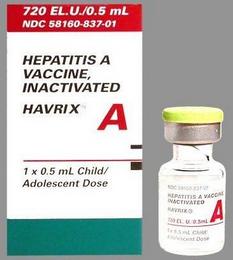Hepatitis A vaccine
What is hepatitis A?
Hepatitis A is a viral infection, which attacks the liver and leads to its inflammation. Liver function is reduced. Waste, are usually isolated in the liver accumulates in the blood. This disease often leads to jaundice (yellowing of the skin and eyes).
Hepatitis A is passed from person to person through contact with feces. You can catch a virus from a sick child, diaper change, or through sexual contact with an infected person. The virus can also be spread by contaminated food and water. Hepatitis B virus is very common in developing countries.
Symptoms of hepatitis a include:
- Jaundice;
- Fatigue;
- Abdominal pain or tenderness;
- Anorexia;
- Nausea;
- Headache, chills.
If you are faced with the virus and have not been vaccinated, injection of vaccine or immunoglobulin (IG) can prevent illness and the spread of the virus. Vaccination should be done as soon as possible.
If you are sick, lifestyle changes can reduce symptoms. If you suffer from fatigue, you need plenty of rest. Consumption of healthy, Balanced meals, avoiding alcohol can help recovery.
Sometimes patients need to be hospitalized with hepatitis. In rare cases, infection can lead to death, If the liver is severely damaged.
What is hepatitis A vaccine?
The vaccine contains a killed or inactivated form of the hepatitis A virus. It is administered by injection into the arm.
Also available is a combination vaccine, which protects against hepatitis A and B forms.

Who and when to be vaccinated against hepatitis A?
The vaccine is recommended for all children 12-23 months. Two doses are administered with a difference 6-18 months. Babies, who have not been vaccinated is advisable to visit a physician and grafted.
You should also get vaccinated following persons:
- Children ages 24 months and older, who have a high risk of disease and have not previously been vaccinated;
- If you plan a trip to the districts, where hepatitis A is common;
- Men, having sex with men;
- Injecting drug users;
- People, who work in dangerous proximity to the virus (eg, person, working in research laboratories);
- People with chronic liver disease;
- People with clotting disorders, such as hemophilia;
- People, who will have close contact with an adopted child from a group of intermediate or high risk;
- People, who want to acquire immunity to hepatitis.
Risks, associated with hepatitis a vaccine
There is the risk of a severe allergic reaction with the following symptoms:
- Labored breathing;
- Skin rash;
- Cardiopalmus;
- Dizziness;
- Breathlessness.
Less common moderate side effects:
- Soreness at the injection site;
- Headache;
- Loss of appetite;
- Fatigue.
Who should not be vaccinated against hepatitis A?
You should not be vaccinated following persons:
- Children aged up to one year;
- Person, who were ill with hepatitis A;
- Person, who had previously had a severe allergic reaction to the vaccine against hepatitis a;
- Person, who had previously had a severe allergic reaction to any component of the vaccine against hepatitis a (including potassium alum, 2-fenoksiэtanol or neomycin);
- Sick (We need to wait for recovery).
What are the ways to prevent hepatitis A vaccination in addition?
- Wash your hands with soap and water, especially after using the toilet or changing nappies.
- Use of immunoglobulin before and after interaction with the hepatitis b virus – Another method for the prophylaxis and treatment of;
- You can use Tvinriks (Twinrix) – vaccine, that protects against hepatitis A and B.
What happens in the event of an outbreak of hepatitis A?
If the cause of the outbreak was contaminated food, its sources are identified and addressed. At any outbreak of hepatitis all persons, in contact with the source of infection or sick need to be vaccinated, to prevent the spread of the virus.
